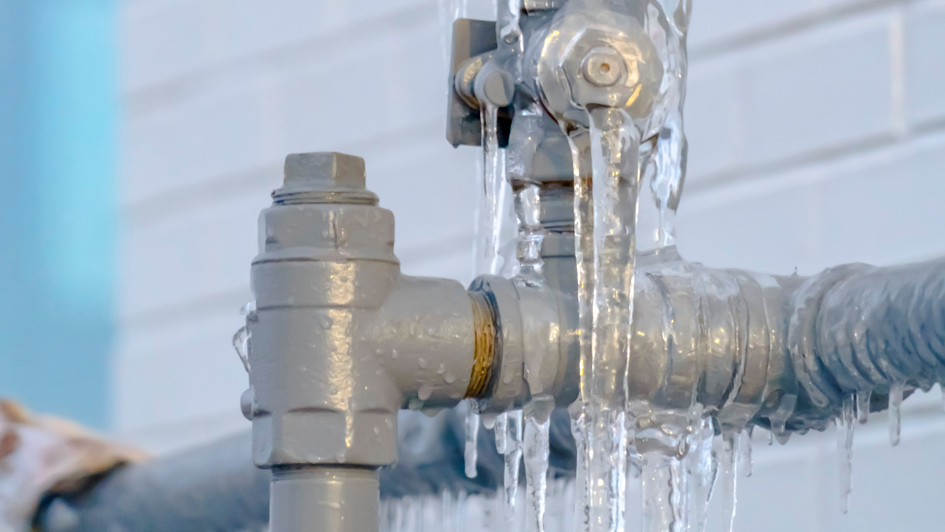
Lots of snow and winter weather brings a fun day sledding down a nearby hill or snowball fights in the front yard. At the same time, winter weather can be difficult on your home. Excessively cold conditions can encourage the water lines in your plumbing to freeze and burst, which may result in serious water damage and long-lasting negative effects.
If your pipes are covered in ice, you should contact a plumber in Ellsworth to handle the problem. That being said, there’s a lot you can try to keep this from happening – and even minor prevention can go a long way.
What Pipes Are at Risk of Freezing
The pipes at the highest risk of freezing are uninsulated water lines. Prevalent locations for exposed pipes are within attic crawlspaces, near exterior walls, in the basement or even running beneath a modular home. Water lines that are not properly insulated are at the highest risk.
How to Stop Pipes from Freezing in Your Home
Properly insulating uncovered water lines is a solid first step to keeping your pipes safe. You’ll generally find many of these materials from a local plumbing company, and might also already have some someplace in your home.
Be mindful not to cover other flammable insulation materials where they may light on fire. If you don’t feel safe insulating the pipes by yourself, contact your local plumbing services professional in Ellsworth to do the job.
If you do prefer to insulate the pipes by yourself, common insulation materials for pipes include:
- Wraps or roll insulation: Most plumbers, hardware stores and large retailers offer insulation – commonly fiberglass, foam wraps or pipe sleeves – that you can use to cover or fit around your pipes. They are supplied in differing lengths and sizes to fit the needs of your home.
- Newspaper: To some degree, newspaper can be used as an insulator. If the weather is getting colder and you aren’t able to put in more insulation before then, try wrapping uninsulated pipes in this.
- Towels or rags: If you don't have the chance to install insulation and don’t have any newspaper close by, wrapping especially vulnerable pipes with towels or clean rags as a last-ditch effort can be just enough to keep the cold air from freezing the pipes.
An additional preventative step you can attempt to keep pipes from freezing in your home is to seal up any cracks that may let cold air in your home. Keep an eye on the window frames, which can let in surprisingly intense drafts. Not only will this help to prevent your pipes from freezing, but it will have the added benefit of making your home more energy efficient.
Five More Ways to Keep Your Pipes from Freezing:
- Open the cabinet doors. Opening the cabinet doors beneath the sinks and other spaces of your home with plumbing will permit more warm air from the rest of the room to reach the pipes.
- Letting water drip. Keeping the water flowing by letting your faucets trickle even just a bit can help avoid frozen pipes.
- Open interior doors. By opening doors for rooms or hallways, your home can be heated more consistently. This is particularly important if you have a room that is frequently colder or hotter than the rest of the home.
- Close the garage door. The exception to the open doors tip is the garage door, which you should keep down – particularly if your water lines are installed under the garage.
- Keep the heat steady. Experts encourage setting the thermostat at a stable temperature and leaving it alone, rather than allowing it to get cooler at night. Set it no colder than 55 degrees.
How to Keep Pipes from Freezing in a Vacant Home
When you’re inside a house, it’s easier to know when something isn't right. But what additional steps can you try to stop pipes from freezing in a vacant home or vacation home when the damages from a frozen pipe can remain unnoticed for a while?
As with a primary residence, adding insulation to any exposed water lines, opening interior doors in the home and winterizing the vacant home are the basic steps to take.
Added Steps to Stop Pipes from Freezing in an Unused Home:
- Leave the heat on. Even though you aren’t going to be there, it’s best to leave the heat on – even if you turn the thermostat down colder than you would if you were there. As with a primary house, experts encourage keeping the temperature at no lower than 55 degrees.
- Shut water off and drain the lines. If you’re going to be out of the house for an extended period of time or are winterizing a vacation cabin or cottage, shutting the water off to the house and emptying the water out of the water lines is an easy way to prevent pipes from freezing and bursting open. Don’t forget to flush the water out of all appliances, like the hot water heater, or the toilets. Make sure you empty all the water from the system. If you are not sure of how to clear out the water from the pipes, or don’t feel confident doing it on your own, a plumber in Ellsworth will be glad to offer support.

